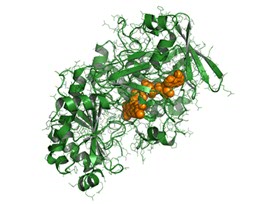Drie Horizon Europe MSCA Doctoral Network subsidies voor de Faculty of Science and Engineering
Drie onderzoekers van de Faculty of Science and Engineering hebben een Horizon Europe MSCA Doctoral Network subsidie ontvangen. Dr. Sandy Schmidt van het Groningen Research Institute of Pharmacy (GRIP) is coördinator van het project BiodeCCodiNNg. Bij dat project is ook hoogleraar Gerrit J. Poelarends (GRIP) betrokken. Poelarends is daarnaast ook nog partner in een ander project genaamd BiocatCodeExpander. Hoogleraar Marco W. Fraaije van het Groningen Biomolecular Sciences and Biotechnology Institute (GBB) is partner in het project DECADES.
Met een Doctoral Network subsidie (voorheen Innovative Training Network) kan een consortium van universiteiten, onderzoeksinstituten en bedrijven een internationaal trainingsnetwerk opzetten voor het opleiden van PhD-studenten.

BiodeCCodiNNg | dr. Sandy Schmidt, coördinator & prof. dr. Gerrit J. Poelarends (beide GRIP)
Dr. Sandy Schmidt is coördinator en hoogleraar Gerrit J. Poelarends is partner in het BiodeCCodiNNg-project. Zij krijgen 820.000 euro van het totale subsidiebedrag van bijna drie miljoen euro. Het project BiodeCCodiNNg wil nieuwe reactiechemie decoderen in enzymen die met het bestaande biokatalysatorportfolio niet toegankelijk is. Daarmee willen de onderzoekers belangrijke moleculen bouwen, bijvoorbeeld uitgangsstoffen voor geneesmiddelen. Het uitbreiden van de toolbox met beschikbare biokatalysatoren die reacties mogelijk maken die nog niet toegankelijk zijn met de bestaande enzymen is een enorme uitdaging. Dit kan veelbelovende nieuwe wegen openen naar toepassingen in de chemische en farmaceutische industrie. Het belangrijkste doel van BiodeCCodiNNg is om de volgende tien visionairs van Europa op te leiden voor een duurzame toekomst in geavanceerde enzymtechnologie. Het netwerk is opgezet door experts van Europese academische instellingen en industriële partners.
BiocatCodeExpander | prof dr. Gerrit J. Poelarends (GRIP)
Hoogleraar Gerrit J. Poelarends is partner in het BiocatCodeExpander project. Dit project ontvangt bijna 2,7 miljoen euro. Het doel van het project is om de diversiteit van functionele groepen die aanwezig zijn in eiwitten uit te breiden. Daarmee willen de onderzoekers de biokatalyse verbeteren door niet-canonieke aminozuren (NCAA's) te gebruiken als bouwstenen voor enzym engineering. Dit Doctoral Network brengt wetenschappers met verschillende expertises samen, variërend van synthetische biologie tot bio-organische chemie. Samen zullen ze tien promovendi opleiden, waarbij ze streven naar de ontwikkeling van efficiënte methodologieën voor NCAA-opname in eiwitten. Het voorgestelde onderzoek levert nieuwe biokatalysatoren en toepassingen op. De nieuw ontworpen biokatalysatoren zijn belangrijk voor de ontwikkeling van nieuwe biotechnologische processen voor een groenere en milieuvriendelijkere productie van chemicaliën en farmaceutica. Poelarends en zijn team ontvangen ongeveer 274.000 euro om nieuwe biokatalysatoren te ontwikkelen voor niet-natuurlijke C-C-bindingvormende reacties; iets waar veel naar wordt gezocht in farmaceutische productieprocessen.

DECADES | prof. dr. Marco W. Fraaije (GBB)
Chemische industrieën worden geconfronteerd met de uitdagende overgang van de klassieke productie van op aardolie gebaseerde chemicaliën naar de duurzame synthese van ‘bio-based’ producten. Dit is een complexe transitie die een interdisciplinaire aanpak vereist. Oplosmiddelen (solvents) spelen een cruciale rol in de chemische industrie in de hele productieketen, maar zijn tegelijk ook grotendeels verantwoordelijk voor de milieu-impact van reacties. Daarom is er dringend behoefte aan nieuwe oplosmiddelen die nuttig kunnen zijn voor synthetische processen en die ook nog eens milieuvriendelijk zijn. Deep Eutectic Solvents (DES's) zijn aangewezen als 'de oplosmiddelen van de 21e eeuw'. DES's hebben perfecte eigenschappen en bieden een nieuwe dimensie als 'Safe- and Sustainable-by-Design' oplosmiddelen voor procesintensificatie in (bio)katalyse. Dit interdisciplinaire Doctoral Network zal zich daarom richten op deze Deep Eutectic Solvents. De Leibniz Universiteit Hannover is coördinator. Eén promovendus gaat aan de slag in de onderzoeksgroep van Marco Fraaije. Diegene zal zich richten op het ontwikkelen van oplosmiddel-bestendige enzymen waarbij computer modellen en berekeningen gebruikt zullen worden.
Meer nieuws
-
17 februari 2026
De lange zoektocht naar nieuwe fysica
-
10 februari 2026
Waarom slechts een klein aantal planeten geschikt is voor leven
